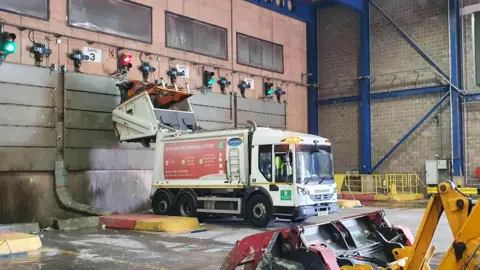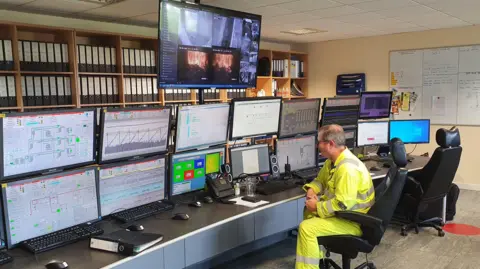Devon councils burning 'majority of their waste'
 Guy Henderson
Guy HendersonCouncils across Devon are recycling less of the rubbish they collect and burning far more.
Plymouth and Torbay are among four councils that went from incinerating nothing at all 10 years ago to burning the majority of their waste.
New figures show rubbish being trucked in from all over Devon, to be incinerated at Devonport’s Energy from Waste facility, with Devon County Council, Plymouth City Council and Torbay Council all using its furnaces.
However, according to the Local Democracy Reporting Service, energy-from-waste companies argue their methods are far better for the environment than landfill.
Research carried out by the BBC Shared Data Unit said councils around the country are bound into decades worth of contracts with companies to burn black bag waste.
Over the past decade, local authorities have reduced household waste sent to landfill, but the investigation said the alternative many councils use, may not be the green solution it has been sold as.
Plymouth and Torbay are among four councils that went from incinerating nothing 10 years ago to burning the majority of their waste.
 Guy Henderson
Guy HendersonHow the figures stack up
- Devon County Council’s recycling has fallen 1.4% since 2015 to 52.4%. In 2015 it sent 31% of waste to landfill and incinerated 13%. By 2023 landfill had dropped to 3.4% but incineration had increased to 43%.
- Recycling in Plymouth has decreased around 4% to 34%. Back in 2015 Plymouth City Council recycled 38% of its waste, landfilled 62%, and incinerated nothing. By 2023 it was burning 66% of its waste.
- Torbay’s recycling has fallen by 3.5% since 2015 to 37%, but the amount of rubbish it sends to landfill is now zero, down from 59% in 2015.
- Incineration of the bay’s non-recycled rubbish over the same period has gone from zero to 63%.
'Reduced emissions'
Devon County Council, Plymouth and Torbay are all members of the South West Devon Waste Partnership, which has a £436 million contract with MVV Environment, the company that runs the Devonport plant.
The Department for the Environment (DEFRA) says energy from waste has played an essential role in moving England away from landfill, and emission limits are set well below the level above which harm to the environment or human health could occur.
A DEFRA spokesperson said: "We are committed to cutting waste and moving to a circular economy so that we re-use, reduce and recycle more resources and help meet our emissions targets."
A spokesman for MVV said greenhouse gas emissions from energy-from-waste plants compared favourably to those from landfill.
"Since 2015, MVV has been treating waste that previously went to landfill – that is waste left over after all efforts have been made to reduce, reuse and/or recycle it.
"Maximum emission limits have been reduced in the last year and we operate within them."
Devon’s contract with MVV still has 15 years to run, while Plymouth and Torbay are contracted until 2052.
Follow BBC Cornwall on X (formerly Twitter), Facebook and Instagram. Follow BBC Devon on X (formerly Twitter), Facebook and Instagram. Send your story ideas to spotlight@bbc.co.uk.
